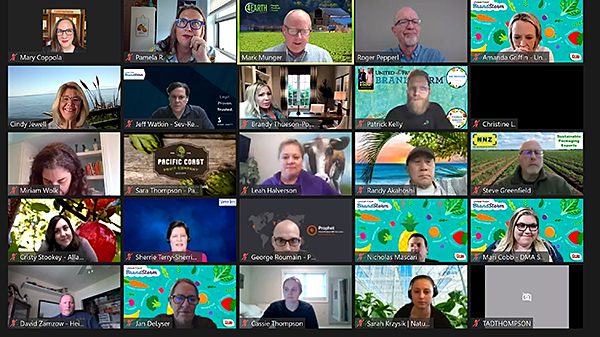BrandStorm featured a lot of Brady Bunch-esque Zoom photo grids, but the conversation was unbeatable.
Wrapping up a fantastic couple of days of UnitedFresh’s BrandStorm marketing conference was a “fireside chat” featuring three produce industry marketing heavyweights: Roger Pepperl, Cindy Jewell, and Mark Munger.
The discussion was a nice wrap-up, tying together a lot of the themes discussed during BrandStorm, from digital marketing, product development, go-to-market strategies, and the elephant in the room at a conference about branding: private labels.
During several of the sessions I attended, attendees brought up the challenges they’re having with retailer pressure to pack under a private label. Many of the big names in retail – Publix, H-E-B, Wegmans, Walmart, Kroger, and Aldi, just to name a few – have strong private brands that continue to expand.
Pepperl, known not to mince words even before his recent retirement, didn’t hold back.
“We cannot let private label ruin our industry,” he said. “When I say private label’s hurting our business it’s because it’s commoditizing things and private label adds cost because it doesn’t lower our cost of doing business, and as a grower it takes away the message.”
It’s a “race to the bottom,” he said.
“Even if your product’s better, if Cindy and I were selling the same item into the same private label bag, we’re going to get paid the same mount of money even if Cindy grew twice as good a product,” he said.
Jewell, who recently left California Giant to start her own marketing and consulting business, agreed.
“I’m one of those kicker and screamers that hates any private label because that just kind of undoes all of the work that you’re doing to build your brand,” she said. “I think the more we work as an industry to form long term strategic partnerships with our customers, the more you get out of that transactional commodity selling day to day stuff.”
Pressure from buyers is the challenge, she said.
“You can’t just take part of it and say ‘we love what you’re doing and that’s great, but we’re gonna put this in a private label and just…it undoes everything,” she said.
Pepperl sees a way out.
“Trademarks, if done right, can save us,” he said. “We’re going through a transitionary period where those will come and delight, and the good ones will win, and it’ll change how we look at trademarks and the trademarks will pull us out of this.”
But it’s going to take work.
“We need fantastic marketers to make the trademarks work and make people increase consumption,” he said.
Wrapping up a fantastic couple of days of UnitedFresh’s BrandStorm marketing conference was a “fireside chat” featuring three produce industry marketing heavyweights: Roger Pepperl, Cindy Jewell, and Mark Munger.
The discussion was a nice wrap-up, tying together a lot of the themes discussed during BrandStorm, from digital marketing, product development, go-to-market strategies, and the elephant in the room at a conference about branding: private labels.
During several of the sessions I attended, attendees brought up the challenges they’re having with retailer pressure to pack under a private label. Many of the big names in retail – Publix, H-E-B, Wegmans, Walmart, Kroger, and Aldi, just to name a few – have strong private brands that continue to expand.
Pepperl, known not to mince words even before his recent retirement, didn’t hold back.
“We cannot let private label ruin our industry,” he said. “When I say private label’s hurting our business it’s because it’s commoditizing things and private label adds cost because it doesn’t lower our cost of doing business, and as a grower it takes away the message.”
It’s a “race to the bottom,” he said.
“Even if your product’s better, if Cindy and I were selling the same item into the same private label bag, we’re going to get paid the same mount of money even if Cindy grew twice as good a product,” he said.
Jewell, who recently left California Giant to start her own marketing and consulting business, agreed.
“I’m one of those kicker and screamers that hates any private label because that just kind of undoes all of the work that you’re doing to build your brand,” she said. “I think the more we work as an industry to form long term strategic partnerships with our customers, the more you get out of that transactional commodity selling day to day stuff.”
Pressure from buyers is the challenge, she said.
“You can’t just take part of it and say ‘we love what you’re doing and that’s great, but we’re gonna put this in a private label and just…it undoes everything,” she said.
Pepperl sees a way out.
“Trademarks, if done right, can save us,” he said. “We’re going through a transitionary period where those will come and delight, and the good ones will win, and it’ll change how we look at trademarks and the trademarks will pull us out of this.”
But it’s going to take work.
“We need fantastic marketers to make the trademarks work and make people increase consumption,” he said.
Pamela Riemenschneider is the Retail Editor for Blue Book Services.



